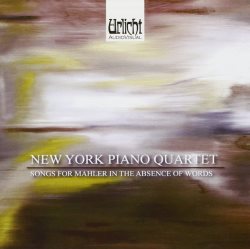|

|
Songs for Mahler in the Absence of Words
Track listing below review
New York Piano Quartet
rec. Edith Memorial Chapel, The Lawrenceville School, Lawrenceville, New Jersey, March 2012
URLICHT AUDIOVISUAL UAV-5998 [72:32]
I'd somehow not imagined a tribute to Mahler organized around a piece of chamber music. The early Piano Quartet is his only known essay in the genre, and he didn't even finish it: the extant first movement and a twenty-seven-bar sketch for a Scherzo are all that we have of it. It's a surprisingly Brahmsian work, laid out in broad, spacious phrases. Despite occasional undercurrents of drama and unease it's basically affirmative in spirit.
Not enough of that Scherzo exists to allow for any sort of "completion," but two of the composers here have written movements based on that sketch, or inspired by it. Enguerrand-Friedrich Lühl continues in a broad-limned Brahmsian vein. He lets some Expressionistic touches creep into his harmony, particularly in the Trio section, but his Scherzo would make an appropriate companion to Mahler's "first" movement. In contrast, Alfred Schnittke's Piano Quartet, as he entitled it, shrouds the same theme in such self-consciously angular garb that you mightn't recognize it. The musical gestures are generic modernist, though there are some intense moments.
Gernot Wolfgang's From Vienna with Love sounds like a Schlagobers moment, and it's anything but. It's the Second Viennese School by way of jazz, or perhaps vice versa. It incorporates some fluid, evocative harmonies, carrying the listener along on its sheer drive and inner logic.
Patricia Leonard's ambitious, expressive Strangely Close, Yet Distant ranks as an honourable failure. The hommage to an established composer is intrinsically hazardous: I remember a Collage on B-A-C-H by Arvo Pärt which left me wanting to hear rather more of Bach and less of Pärt. Leonard's score, which repeatedly invokes the opening of the finale of Mahler's Ninth Symphony, unfortunately falls right into the trap. Leonard herself crafts gorgeous, yearning music, but each time that chorale theme returns, it's game, set, and match for Mahler — she simply hasn't a chance.
Cristina Spinei, who uses "looping" techniques such as those applied to electronic composition, conjures a shapely polyrhythmic construction in which repeated, gently struck piano notes contribute to a shimmering texture. Conversely, the thematic fragments of Barney Johnson's explicitly Minimalist endeavour, seemingly deployed at random, never line up in any sort of comprehensible harmony or rhythm. This results in an aimless, shapeless mass that, though about the same length as Spinei's piece, feels twice as long.
The remaining scores, like Johnson's, don't quite pan out. Wang Jie's eponymous, abstract piece was commissioned for the New York Chamber Music Festival's Mahler memorial program in 2012. Its opening is dominated by a sense of aching loss, but the music goes adrift shortly thereafter. Nicolás Prada's Reflections on Mahler is nominally based in the materials of Colombian folklore, but, save in its ostinatos, it's hard to hear any explicit Latin influence. Noel Zahler's Le miroir de l'ombre is moody and searching, but its collection of new-music clichés tapers off into nowhere.
The New York Piano Quartet, comprising musicians associated with the Metropolitan Opera, does a nice job with a demanding assignment. They play the Mahler with a solid tone and a sure sense of direction, outclassing the lighter-boned Domus version once available on Virgin Classics. Elsewhere, they project the diverse styles the programme requires with understanding and finesse.
Stephen Francis Vasta
Stephen Francis Vasta is a New York-based conductor, coach, and journalist.
Track Listing
Gustav MAHLER (1860-1911)
Piano Quartet (1876) [12:21]
Enguerrand-Friedrich LÜHL (b.1975)
Scherzo [5:48]
Gernot WOLFGANG (b.1957)
From Vienna with Love (2011) [5:47]
Cristina SPINEI (b.1984)
Mahler Remixed (2011) [5:13]
Barney JOHNSON (?)
Mahler99 (2011) [5:11]
Wang JIE (b.1980)
Songs for Mahler in the Absence of Words (2012) [5:43]
Noel ZAHLER (b.1951)
Le miroir de l'ombre (2011) [4:35]
Patricia LEONARD
Strangely Close, Yet Distant (2003) [14:06]
Alfred SCHNITTKE (1934-1998)
Piano Quartet (1988) [8:11]
Nicolás PRADA (b.1990)
Reflections on Mahler [4:34]
 |
 |
|











